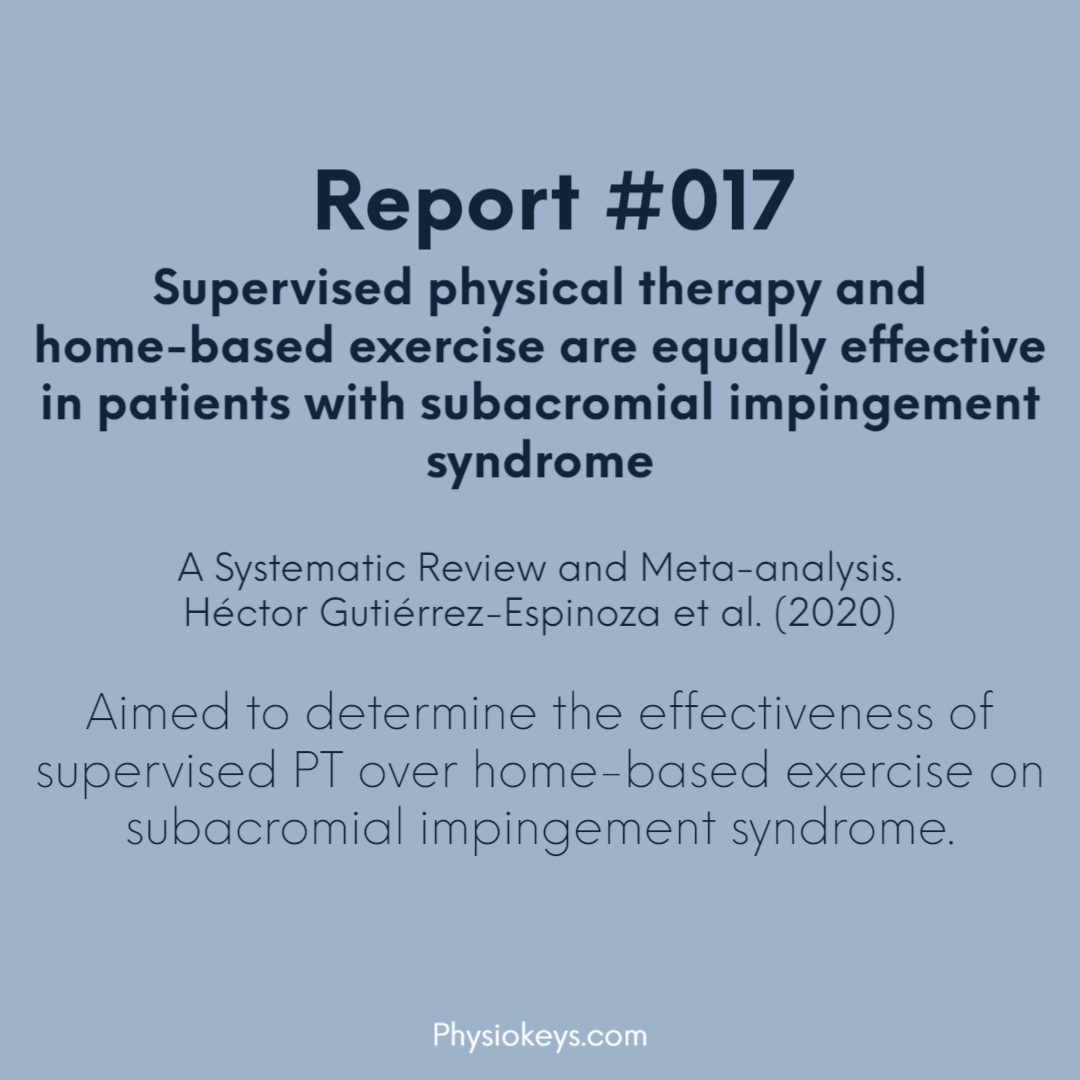#017- Home-Based exercise for Subacromial Impingement Syndrome
Estimated reading time: 1 minute, 23 seconds.*
Supervised physical therapy and home-based exercise are equally effective in patients with subacromial impingement syndrome
This systematic review and meta-analysis aimed to determine the effectiveness of supervised PT over home-based exercise on subacromial impingement syndrome.
- 7 studies in systematic review and 4 studies in meta-analysis.
- 205 Participants received supervised PT and 166 participants received home-based program.
Supervised PT program included:
- Strengthening: for rotator cuff and subscapular muscles (4 studies).
- Stretching: for rotator cuff and subscapular muscles (3 studies), and capsular and pectoral stretching (1 study).
- Manual therapy: cervicothoracic manipulation (1 study) and joint and soft tissue mobilization (1 study).
- Virtual reality: Nintendo Wii games (boxing, bowling, and tennis).
- Doses range: 3 sets of 10 repetitions/daily to as long as possible/day for 5 to 6 weeks.
Home-based exercise program:
- 6 Studies used the same program as supervised PT.
- 1 Study applied unspecific exercises for neck and shoulder without an external load, in addition to subacromial corticosteroid injection.
- Doses:
- 30 to 45 minutes/day, 2 days/week for 5 to 6 weeks. (3 Studies)
- Once or twice a day for 12 weeks. (4 studies)
Results:
- Shoulder Function:
- No significant difference between shoulder function in supervised physiotherapy group and home exercise program.
- As measured by Shoulder Pain and Disability Index (SPADI), Constant-Murley questionnaire or Shoulder Disability Questionnaire (SDQ).
- Pain:
- No significant difference in the level of pain in the supervised physiotherapy group compared with the home exercise group.
- As measured by visual analog scale (VAS).
- Active ROM:
- No significant difference in the active flexion in the supervised physiotherapy group compared with the home exercise group.
- Measured using a goniometer or inclinometer.
Learned from this study:
- Supervised physiotherapy program and home-based exercise for subacromial impingement syndrome are equally effective.
- Most programs included strengthening and stretching for rotator cuff and scapular muscles.
Note:
- There are several limitations of this study
- Inadequate sample size, unclear randomization, concealed allocation and lack of blinding.
Final Note
- For therapists that work in busy settings or where you can not provide multiple sessions, having evidence for the effectiveness of home-based programs is really helpful.
Recommended reads:
- The Effects of Injury Prevention Programs on the Biomechanics of Landing Tasks: A Systematic Review With Meta-analysis. (Restricted Access)
References
- Effect of supervised physiotherapy versus home exercise program in patients with subacromial impingement syndrome: A systematic review and meta-analysis. (Restricted Access)
*Calculation is based on the average reading speed that around 200 words per minute (wpm).


